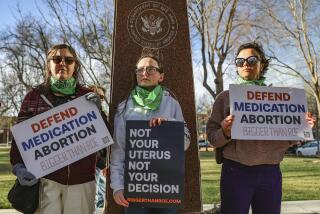Obama administration reverses course on Plan B pill
The Obama administration dropped its long-standing opposition to over-the-counter sales of a controversial morning-after pill Monday and decided to permit consumers of any age to buy Plan B One-Step without a prescription.
In papers filed in federal court in New York, government attorneys announced that the Food and Drug Administration and the Department of Health and Human Services would remove age and point of sale restrictions on the emergency contraceptive, pending approval by U.S. District Judge Edward Korman.
The decision would not apply to similar brands of emergency contraceptives, or to a two-pill version of the same drug, which is manufactured by the Israel-based pharmaceutical firm Teva. Loretta Lynch, U.S. attorney for the Eastern District of New York, wrote in the court papers that other manufacturers could submit approval applications, but the FDA might grant Teva “marketing exclusivity.”
The limited nature of the government’s proposal could be an issue for Korman, who has ordered that all such drugs be available over the counter like aspirin. If he approves it, however, the government said it would drop its appeal of an order he issued in April.
The drugs have prompted a long-running legal battle between two White House administrations and reproductive rights advocates, who contend that the government unnecessarily restricts access to birth control. Last week, a federal appeals court refused, in part, to grant the government’s request to block the sale of all levonorgestrel-based emergency contraceptives without restriction.
Plan B One-Step, like the related two-pill Plan B, uses the synthetic hormone levonorgestrel to prevent pregnancy by blocking ovulation and impeding the mobility of sperm. Neither Plan B nor Plan B One-Step causes an abortion, nor does either harm a fetus.
Plaintiffs in the lawsuit suggested Monday that the government’s decision was unlikely to end the legal battle anytime soon.
“Now that the appeals court has forced the federal government’s hand, the FDA is finally taking a significant step forward by making Plan B One-Step available over the counter for women of all ages,” Nancy Northup, president and chief executive of the Center for Reproductive Rights, said in a statement. “But the Obama administration continues to unjustifiably deny the same wide availability for generic, more affordable brands of emergency contraception.”
“We will continue to fight for fair treatment for women who want and need more affordable options,” she said.
Groups that oppose the drugs’ availability criticized the government for reversing course. They contend that allowing underage girls to buy the pills undermines parents’ rights.
The prospect of young girls purchasing the $50 pill after engaging in sex makes the issue highly sensitive. President Obama has said he was bothered by the idea of 10- or 11-year-old girls buying the drugs as easily as “bubble gum or batteries.”
Korman has been highly critical of the government. He has written in court documents that U.S. Health and Human Services Secretary Kathleen Sebelius acted in “bad faith” and was “politically motivated,” when she overruled the FDA’s 2011 effort to make the drugs available to all ages without a prescription.
“The FDA is not the problem,” Korman wrote. “The cause of the rejection of over-the-counter sale of levonorgestrel-based emergency contraceptives was the secretary of Health and Human Services.”
Because the pills are most effective when taken immediately after unprotected intercourse, reproductive rights groups have complained that government purchasing restrictions cause unnecessary delays or prevent access to the drugs.
Acknowledging those concerns, Korman issued an order April 5 that the drugs must be sold over the counter, without age restrictions, within 30 days. Instead, the FDA lowered the minimum purchasing age from 17 to 15.
The Justice Department appealed Korman’s order and sought a stay, arguing that it would violate the separation of powers if a judge dictated the sale of drugs rather than the FDA.
Last week’s appeals court ruling complicated matters further by permitting unrestricted sale of the two-pill drug until the appeal was decided. In Monday’s filing, Lynch wrote that the drug manufacturer had provided data on the ability of adolescents to understand drug-use instructions for Plan B One-Step, but not the two-pill version.
More to Read
Sign up for Essential California
The most important California stories and recommendations in your inbox every morning.
You may occasionally receive promotional content from the Los Angeles Times.










